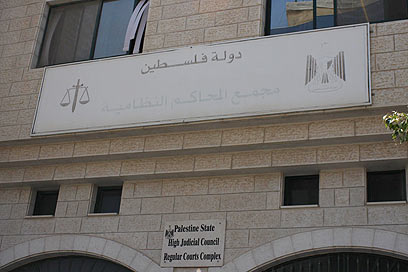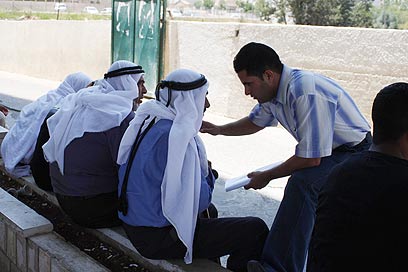
Quiet revolution in PA: Rule of law returns
Palestinian judicial system still weak, inexperienced, tainted with corruption but courts developing, more experienced lawyers in this 'state in the making'
The upper echelons of the Palestinian Authority took an interest in Ramallah court's ruling last month to acquit three men accused of a murder that took place about three years ago in the area. The ruling was not altered, but as a result of the intervention of senior PA figures, the three suspects have been kept in prison until a ruling is handed down on the prosecution's appeal against the acquittal. It seems this decision was made due to fears that the victim's family may take matters into its own hands.
This is just one example of problematic aspects of the PA judicial system, which is still experiencing birth pangs. The Palestinian law book was completed only in 2002 and until then the legal system was based on Jordanian law (in the West Bank) Egyptian law (in the Gaza Strip) and Israeli law. And even today, as the example shows, laws are still sometimes perceived more as a recommendation.
However, things are changing. For instance, a case that rocked the PA was last year's murder of a resident of the Jalzon refugee camp, near Ramallah, by three suspects – one of whom was only 15 years old. His age attracted enormous attention to the case, which marks a change for a society which until recently had only one thing on its mind: the occupation. The court was packed with reporters, much to the distress of the defense counsel which wanted to eject them from the court.

However, the judge decided the reporters had a right to remain. The decision was later backed up by the High Judicial Council, the judicial system's umbrella body, whose head is also the Supreme Court president. The Council said press coverage of such cases could act as a deterrent to would-be criminals. Following this case, the Council even formulated codes to guide media involvement in legal issues.
End of anarchy?
Judicial sources within the PA say that the political and security establishments have often interfered in court decisions, though the number of such cases has decreased in recent years.
"We are working systematically to strengthen the judicial system's independence," said PA government spokesman Dr. Rassan Hatib. "This independence is also a result of the security stability in PA territories and the end of anarchy."
According to research carried out by the US Agency for International Development, some 10% of PA judges say they have been pressured regarding court decisions by senior PA figures or relatives. This is why many Palestinians think that despite progress, the judicial system is still not completely neutral.
However, it seems that in the last three years the PA judicial system has become a body with teeth. Courts have sprung up in all major Palestinian towns, and a supreme court has been formed in Ramallah. This court functions as the last instance for appeals in both civil and criminal cases but is also authorized to discuss appeals on PA decisions and suits against the PA – the Palestinian equivalent of Israel's High Court.
Legal faculties are also springing up and new attorneys are flooding the market – so much so, that the bar association and the High Judicial Council are considering extending new lawyers' internships.
"We are prioritizing the development of the judicial system," Dr. Hatib said, adding that PA lawyers participate in training programs in Palestinian territories and abroad, in order to reach the highest levels of professionalism.
Suing the president
Ahmed al-Sayyad, a veteran Palestinian lawyer who also served as president of the Palestinian Bar Association from 2005 to 2007, is in agreement with Hatib's assessment of changes. "We would sue government ministries, ministers and even President Abu Mazen (Mahmoud Abbas) himself, if he is behind certain decisions," he said.
Sayyad is one of a small number of relatively old leading attorneys – above the age of 60. He told Ynet about their work in the PA. "We do not charge an hourly fee, and even percentage commissions are uncommon," he said. "Maximum fees for a particularly hard and complex case can reach $50,000. Murder, which is supposed to be a source of high fees, is the lot of people from the lower strata of society. Lawyers are not disconnected from the economic situation around them, so our fees are less than fees in neighboring states and Israel."

"The Palestinian Authority received a complex inheritance which clouded the development of the judicial system," he adds. "The system had limited capabilities, and the people working in it had little experience. The number of workers, whether clerks or judges, was very small."
Sayyad says the culture which developed in the PA, in the shadow of the al-Aqsa intifada, was a long way from the rule of law because violation of the law was seen as resistance to the occupation. "Today, people are being re-educated about this issue," he said.
During the intifada, he explains, the PA regime also violated the law, especially the security services which until recently had enormous influence on the Palestinian judicial system.
"There is corruption, but not significant," he asserts. "It must be remembered that PA commanders and senior figures who came after Oslo (the Oslo Accords of 1993) came from places where the rule of law was not exactly the guiding principle. Therefore the regime's attitude to citizens did not always take the law into consideration."
Going to the hamula arbitrator
Although there is a feeling that the PA judicial system is convoluted and tainted with corruption, 70% of Palestinians in the West Bank prefer to go to the courts for arbitration. Many of the other 30% put their trust in the hamula (extended family or clan) arbitrator.
According to a senior Palestinian judicial source, this situation is very grave because sometimes even the police propose that the parties take their disagreement to the hamula.
The ruling handed down by the hamula arbitrator, it turns out, carries more weight that the court's, and constitutes the final word that precludes any "paying back" at a future date.
The PA is not fighting the "alternative" hamula judicial system, but makes every effort to ensure that serious cases, particularly murder and manslaughter, are dealt with in court. The message is clear: The rule of law is back.
- Follow Ynetnews on Facebook










